裕兴新概念第二册第一课笔记
- 格式:docx
- 大小:50.28 KB
- 文档页数:18
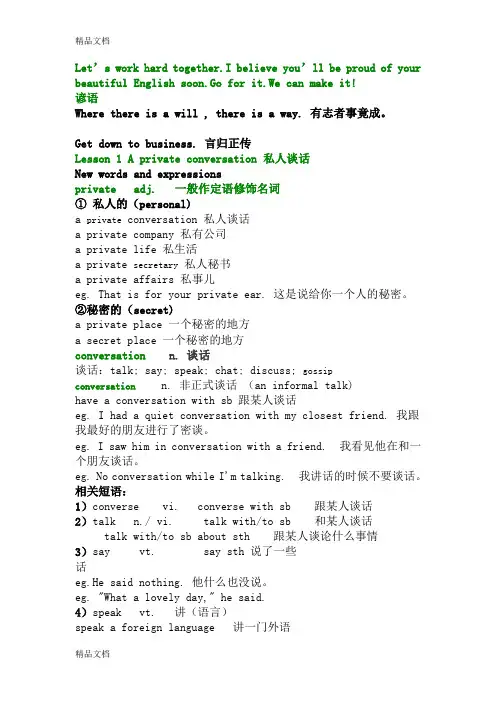
Let’s work hard together.I believe you’ll be proud of your beautiful English soon.Go for it.We can make it!谚语Where there is a will , there is a way. 有志者事竟成。
Get down to business. 言归正传Lesson 1 A private conversation 私人谈话New words and expressionsprivate adj. 一般作定语修饰名词① 私人的(personal)a private conversation 私人谈话a private company 私有公司a private life 私生活a private secretary私人秘书a private affairs 私事儿eg. That is for your private ear. 这是说给你一个人的秘密。
②秘密的(secret)a private place 一个秘密的地方a secret place 一个秘密的地方conversation n. 谈话谈话:talk; say; speak; chat; discuss; gossipconversation n. 非正式谈话(an informal talk)have a conversation with sb 跟某人谈话eg. I had a quiet conversation with my closest friend. 我跟我最好的朋友进行了密谈。
eg. I saw him in conversation with a friend. 我看见他在和一个朋友谈话。
eg. No conversation while I'm talking. 我讲话的时候不要谈话。
相关短语:1)converse vi. converse with sb 跟某人谈话2)talk n./ vi. talk with/to sb 和某人谈话talk with/to sb about sth 跟某人谈论什么事情3)say vt. say sth 说了一些话eg.He said nothing. 他什么也没说。
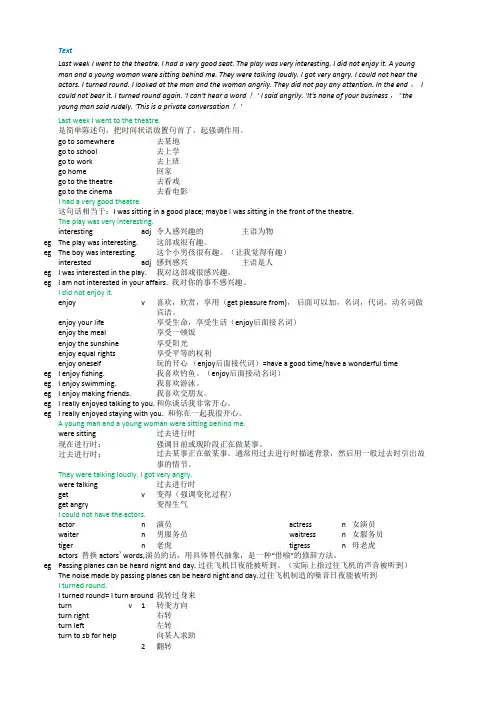
TextLast week I went to the theatre.是简单陈述句,把时间状语放置句首了,起强调作用。
go to somewhere 去某地go to school 去上学go to work 去上班go home 回家go to the theatre 去看戏go to the cinema 去看电影I had a very good theatre.这句话相当于:I was sitting in a good place; maybe I was sitting in the front of the theatre.The play was very interesting.interesting adj 令人感兴趣的 主语为物eg The play was interesting.这部戏很有趣。
eg The boy was interesting.这个小男孩很有趣。
(让我觉得有趣)interested adj 感到感兴主语是人eg I was interested in the play.我对这部戏很感兴趣。
eg I am not interested in your affairs. 我对你的事不感兴趣。
I did not enjoy it.enjoy v enjoy your life 享受生命,享受生活(enjoy 后面接名词)enjoy the meal 享受一顿饭enjoy the sunshine 享受阳光enjoy equal rights 享受平等的权利enjoy oneself 玩的开心 (enjoy 后面接代词)=have a good time/have a wonderful time eg I enjoy fishing.我喜欢钓鱼。
(enjoy 后面接动名词)eg I enjoy swimming.我喜欢游泳。
eg I enjoy making friends.我喜欢交朋友。
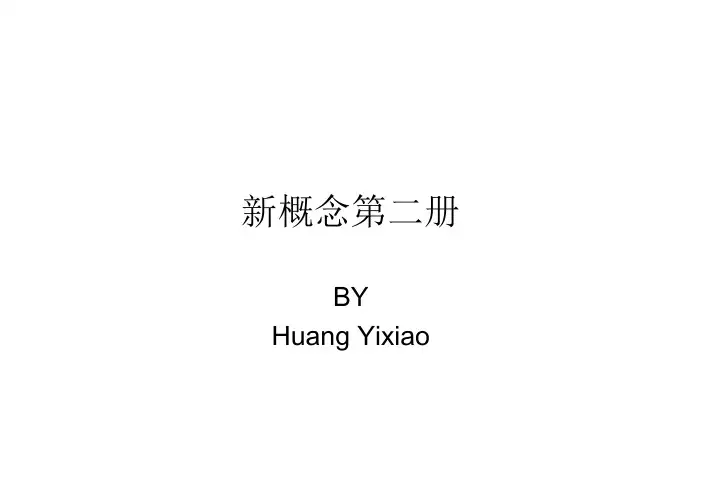
新概念第二册BYBYHuang YixiaoIntroduction•学习方法和指导法指•系统性、趣味性、实用性•That is the most systematic, the most interesting and the most practical.i t ti d th t ti l•本册分为四个单元,每单元都是在复习前面的基础上补充新的内容。
•每课都分为:单词,关键句型,课文(难每课都分为单词关键句型课文(难点),补充内容(谚语,绕口令)等Introduction(2)Introduction (2)•Let’s work hard together. I believe you’ll be p y gproud of your beautiful English soon.•Where there is a will, there is a way.•(有志者事竟成)•Now, get down to businesso,get do to bus ess•(言归正传)Lesson1A private conversation Lesson 1 A private conversation•This story is about some people in the theatre.•Before the listening…Wh did th it l t k?•Where did the writer go last week?y d d t e e joy t e p ay•Why didn’t he enjoy the play?•What did the young man say to the writer?Answers•He went to the theatre.Because he could not hear the actors. A •Because he could not hear the actors A young man and a young woman were talking loudlytalking loudly.•He said,” it’s none of your business, it’s a private conversation.”New Words&Expressions New Words & Expressions •Private adj. 私人的的Conversation n. 谈话•Conversation n•Theatre n.剧场,戏院•Seat n.座位Play n•Play n. 戏•Loudly adv.大声地New Words&ExpressionsNew Words & Expressions(2)•Angry adj.生气的Angrily adv. 生气地•Angrily adv•Attention n. 注意•Bear (bore, borne) v.容忍Business n•Business n.事•Rudely adv. 无礼地,粗鲁地Private•Private adj.•私人的(personal)•A private conversation, a private company, a private life, a private secretary, privatei t lif i t t i t affairs•Eg. That is for your private car.•私密的p p p•A private place, a secret placeConversationConversation•Conversation n. 谈话•近义词:Talk; say; speak; chat; discuss; gossipy p g p •Conversation n. 非正式谈话(an informal talk)-have a conversation with sbhave a conversation with sb•Eg. I had a quite conversation with my closest friend.friend•I saw him in conversation with a friend.•No conversation while I am talking.•Conversation v.Conversation with sb.•Conversation with sb•Talk n./v. : talk with / to sb. (about sth.)•Say vt.Say sth•Say sth•Eg. He said nothing.•“What a lovely day”, he said.•Speak vt.Speak a foreign language •Speak a foreign language •Speck Chinese•Speak EnglishSpeak vi•Speak vi.•Speak to sb.•Speech n. Make a peech•Chat n./v. 聊天(talk friendly)•We had a long chat about old times We had a long chat about old times.•Discuss v. 有着严肃目的的讨论•Discussion n.Gossip v/n refers to talk about private •Gossip v./n. refers to talk about private lives of other people (贬义)•He is nothing but a gossipTheatreTheatre•Theatre n. (in US: Theater) Metre–meter•Metre –meter•Centre –center•Go to the theatreGo to the theatre•Go to the movies•Go to the filmG h fil•Go to the cinema•Theatre =(口语) play houseg p y g •Theatre goer 戏迷play goerSeatSeat•SeatS t•区别别•Seat n./vt. Si:t•Sit vi sitSit vi sit•Chair•Eg. We don’t have enough chairs here.•SeatSeat•Eg. Is this seat taken?座位座•1.n.座位。
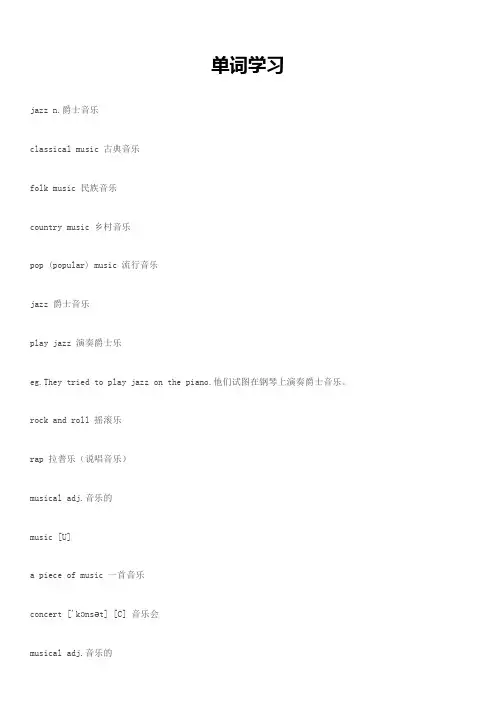
单词学习jazz n.爵士音乐classical music 古典音乐folk music 民族音乐country music 乡村音乐pop (popular) music 流行音乐jazz 爵士音乐play jazz 演奏爵士乐eg.They tried to play jazz on the piano.他们试图在钢琴上演奏爵士音乐。
rock and roll 摇滚乐rap 拉普乐(说唱音乐)musical adj.音乐的music [U]a piece of music 一首音乐concert ['kɔnsət] [C] 音乐会musical adj.音乐的musician n.音乐家a music lesson 一堂音乐课a music teacher 音乐教师a music lover 音乐爱好者a piece of music 一首音乐face the music 面对失败;面对不愿面对而又不得不面对之事(说法: 1.新演员初上舞台非常紧张, 但是音乐响起了, 不得不上舞台, 必须去面对音乐, 面对自己不敢面对的事情;2.新兵入伍后参与军事检阅, 军乐响起来了, 不得不按照节拍去走, 哪怕再紧张也没有用。
)a musical instrument 一件乐器a misical performance 乐器演奏a musical score [skɔ:] 乐谱musical voice 美妙的声音instrument1) 器具, 仪器torture ['tɔ:tʃə] instruments 刑具operation instruments 手术器械2) 乐器musical instrument 乐器-----What kind of musical instrument can you play? 你会演奏哪种乐器呢?-----I can play the guitar.我会弹吉他。
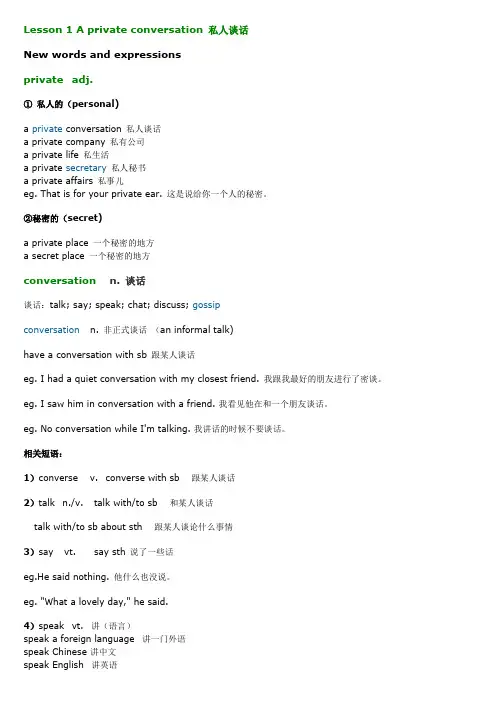
Lesson 1 A private conversation 私人谈话New words and expressionsprivate adj.①私人的(personal)a private conversation 私人谈话a private company 私有公司a private life 私生活a private secretary私人秘书a private affairs 私事儿eg. That is for your private ear. 这是说给你一个人的秘密。
②秘密的(secret)a private place 一个秘密的地方a secret place 一个秘密的地方conversation n. 谈话谈话:talk; say; speak; chat; discuss; gossipconversation n. 非正式谈话(an informal talk)have a conversation with sb 跟某人谈话eg. I had a quiet conversation with my closest friend. 我跟我最好的朋友进行了密谈。
eg. I saw him in conversation with a friend. 我看见他在和一个朋友谈话。
eg. No conversation while I'm talking. 我讲话的时候不要谈话。
相关短语:1)converse v. converse with sb 跟某人谈话2)talk n./v. talk with/to sb 和某人谈话talk with/to sb about sth 跟某人谈论什么事情3)say vt. say sth 说了一些话eg.He said nothing. 他什么也没说。
eg. "What a lovely day," he said.4)speak vt. 讲(语言)speak a foreign language 讲一门外语speak Chinese 讲中文speak English 讲英语speak vi. 谈话speak to sb 和某人谈话speech n. 讲话谈话make a speech 做演讲5)chat n./v. 聊天(talk friendly 友好地谈话)eg. We had a long chat about old times. 我们聊了很多关于过去的事。
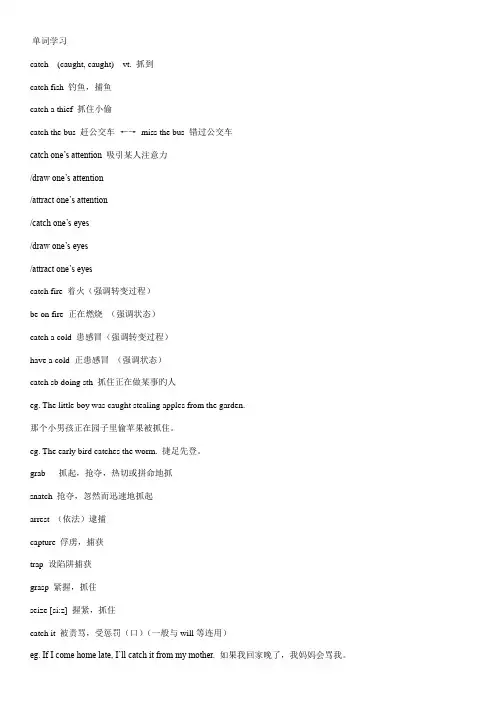
单词学习catch (caught, caught) vt. 抓到catch fish 钓鱼,捕鱼catch a thief 抓住小偷catch the bus 赶公交车←→miss the bus 错过公交车catch one’s attention 吸引某人注意力/draw one’s attention/attract one’s attention/catch one’s eyes/draw one’s eyes/attract one’s eyescatch fire 着火(强调转变过程)be on fire 正在燃烧(强调状态)catch a cold 患感冒(强调转变过程)have a cold 正患感冒(强调状态)catch sb doing sth 抓住正在做某事旳人eg. The little boy was caught stealing apples from the garden.那个小男孩正在园子里偷苹果被抓住。
eg. The early bird catches the worm. 捷足先登。
grab 抓起,抢夺,热切或拼命地抓snatch 抢夺,忽然而迅速地抓起arrest (依法)逮捕capture 俘虏,捕获trap 设陷阱捕获grasp 紧握,抓住seize [si:z] 握紧,抓住catch it 被责骂,受惩罚(口)(一般与will等连用)eg. If I come home late, I’ll catch it from my mother. 如果我回家晚了,我妈妈会骂我。
catch up with 赶上eg. Go ahead, please. I’ll soon catch up wit h you. 你先走吧,我会不久赶上你旳。
catch on (意见,潮流)受欢迎旳catch phrase 标语,引人注意旳句子fisherman n. 钓鱼人,渔民fish →fisherman (pl. fishermen)fish n. 鱼[C]1) fish 鱼[pl.] 单复数同形2) fishes 不同种类旳鱼a big fish in a small pond. 山中无老虎猴子称霸王eg. When the cat is away, the mice will play. 老猫不在家老鼠笑呵呵。
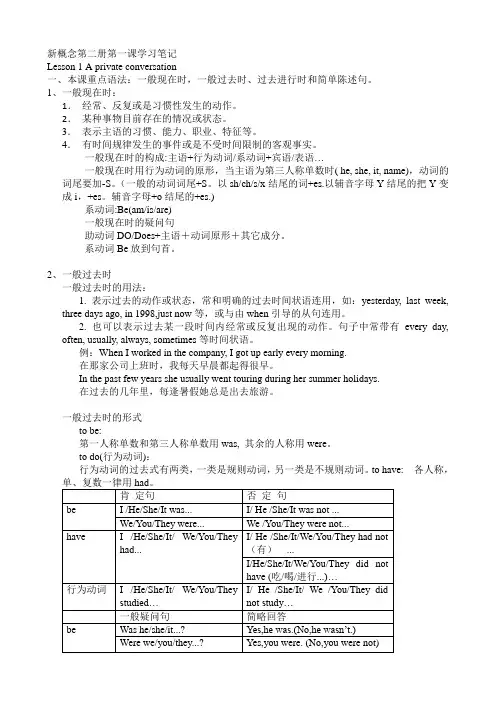
新概念第二册第一课学习笔记Lesson 1 A private conversation一、本课重点语法:一般现在时,一般过去时、过去进行时和简单陈述句。
1、一般现在时:1.经常、反复或是习惯性发生的动作。
2.某种事物目前存在的情况或状态。
3.表示主语的习惯、能力、职业、特征等。
4.有时间规律发生的事件或是不受时间限制的客观事实。
一般现在时的构成:主语+行为动词/系动词+宾语/表语…一般现在时用行为动词的原形,当主语为第三人称单数时( he, she, it, name),动词的词尾要加-S。
(一般的动词词尾+S。
以sh/ch/s/x结尾的词+es.以辅音字母Y结尾的把Y变成i,+es。
辅音字母+o结尾的+es.)系动词:Be(am/is/are)一般现在时的疑问句助动词DO/Does+主语+动词原形+其它成分。
系动词Be放到句首。
2、一般过去时一般过去时的用法:1. 表示过去的动作或状态,常和明确的过去时间状语连用,如:yesterday, last week,three days ago, in 1998,just now等,或与由when引导的从句连用。
2. 也可以表示过去某一段时间内经常或反复出现的动作。
句子中常带有every day,often, usually, always, sometimes等时间状语。
例:When I worked in the company, I got up early every morning.在那家公司上班时,我每天早晨都起得很早。
In the past few years she usually went touring during her summer holidays.在过去的几年里,每逢暑假她总是出去旅游。
一般过去时的形式to be:第一人称单数和第三人称单数用was, 其余的人称用were。
to do(行为动词):行为动词的过去式有两类,一类是规则动词,另一类是不规则动词。
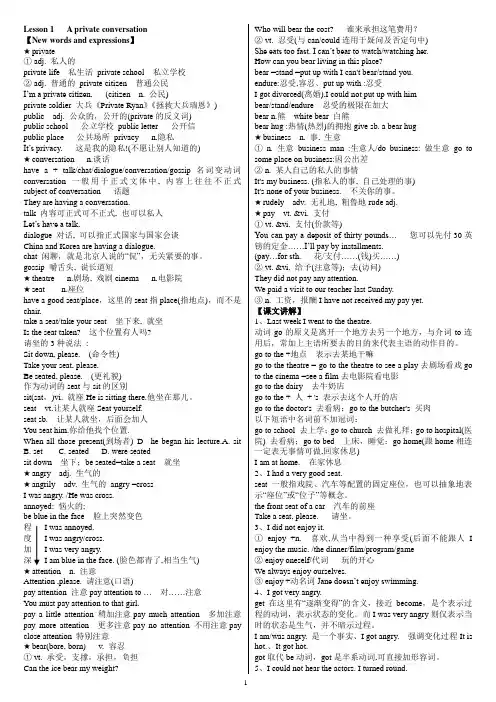
Lesson 1 A private conversation【New words and expressions】★private① adj. 私人的private life 私生活private school 私立学校② adj. 普通的private citizen 普通公民I’m a private citizen. (citizen n. 公民)private soldier 大兵《Private Ryan》《拯救大兵瑞恩》) public adj. 公众的,公开的(private的反义词)public school 公立学校public letter 公开信public place 公共场所privacy n.隐私It’s privacy. 这是我的隐私!(不愿让别人知道的)★conversation n.谈话have a + talk/chat/dialogue/conversation/gossip 名词变动词conversation 一般用于正式文体中, 内容上往往不正式subject of conversation 话题They are having a conversation.talk 内容可正式可不正式, 也可以私人Let’s have a talk.dialogue 对话, 可以指正式国家与国家会谈China and Korea are having a dialogue.chat 闲聊,就是北京人说的“侃”,无关紧要的事。
gossip 嚼舌头, 说长道短★theatre n.剧场, 戏剧cinema n.电影院★seat n.座位have a good seat/place,这里的seat指place(指地点),而不是chair.take a seat/take your seat 坐下来, 就坐Is the seat taken? 这个位置有人吗?请坐的3种说法:Sit down, please. (命令性)Take your seat, please.Be seated, please. (更礼貌)作为动词的seat与sit的区别sit(sat,)vi. 就座He is sitting there.他坐在那儿。
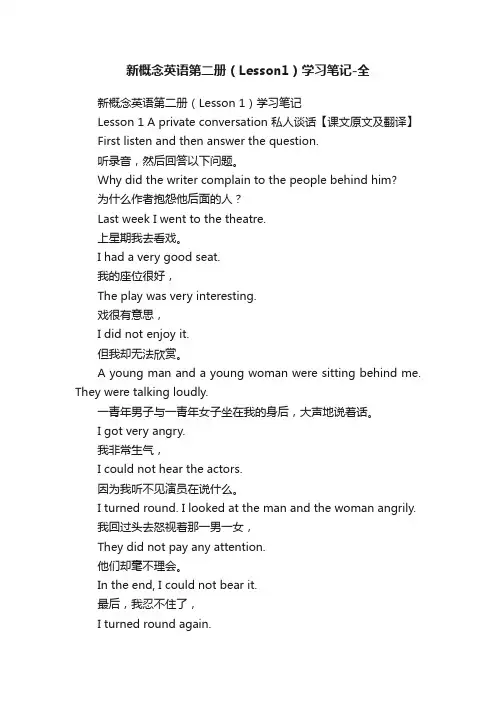
新概念英语第二册(Lesson1)学习笔记-全新概念英语第二册(Lesson 1)学习笔记Lesson 1 A private conversation 私人谈话【课文原文及翻译】First listen and then answer the question.听录音,然后回答以下问题。
Why did the writer complain to the people behind him?为什么作者抱怨他后面的人?Last week I went to the theatre.上星期我去看戏。
I had a very good seat.我的座位很好,The play was very interesting.戏很有意思,I did not enjoy it.但我却无法欣赏。
A young man and a young woman were sitting behind me. They were talking loudly.一青年男子与一青年女子坐在我的身后,大声地说着话。
I got very angry.我非常生气,I could not hear the actors.因为我听不见演员在说什么。
I turned round. I looked at the man and the woman angrily.我回过头去怒视着那一男一女,They did not pay any attention.他们却毫不理会。
In the end, I could not bear it.最后,我忍不住了,I turned round again.又一次回过头去,'I can't hear a word!' I said angrily.生气地说:“我一个字也听不见了!”'It's none of your business,' the young man said rudely.“不关你的事,”那男的毫不客气地说,'This is a private conversation!'“这是私人间的谈话!”【精讲笔记】★private adj.私人的如果妈妈想看你的信, 你可以说: It's my private letter.如果陌生人想进你的房子, 你可以说: It's my private house.private life 私生活由此引申出privacy n.隐私: private life 私生活It’s privacy.这是我的隐私!(不愿让别人知道的)新东方是private school(私立学校), 与此相反, 公立学校是public school.所以, private的反义词是public.eg.public 公众; public letter 公开信; public place 公共场所private还有一个值得注意的意思: 普通的.如: private citizen 普通公民:I’m a private citizen.private soldier 大兵;我们熟悉的《拯救大兵瑞恩》就是《Private Ryan》★conversation n.谈话subject of conversation : 话题(天气是英国人最喜爱的话题)【几种谈话】1、talk 内容可正式可不正式, 也可以私人: Let’s have a talk.2、conversation 一般用于正式文体中, 内容上往往不正式: They are having aconversation.3、dialogue 对话, 可以指正式国家与国家会谈:China and Korea are havinga dialogue.4、chat 闲聊, 就是北京人说的“侃”, 说的是无关紧要的事.5、gossip 嚼舌头, 说长道短have a + talk/chat/dialogue/conversation/gossip 名词变动词★seat n.座位这个词很重要, 考试常考.have a good seat,这里的seat指place(指地点不错), 而不是chair.take a seat/take your seat 坐下来, 就坐下面这个句子在口语、电影里很常见: Is the seat taken?(这个位置有人吗?) 考点: 作为动词的seat与sit的区别sit--vi; seat—vteg: He is sitting there.他住在那儿.You seat him.你给他找个位置.seat sb让某人就坐,后面会加人eg: seat yourselft.Seat him.★play n.戏★loudly adv. 大声的★angry adj. 生气的cross=angry ; I was angry./He was cross.annoyed: 恼火的;程I was annoyed.度I was angry/cross.加I was very angry.深be blue in the face : I am blue in the face.(脸色都青了, 相当生气了) △bear(bore,borne) v. 容忍bear,standI can't bear/stand youendure:忍受,容忍put up with :忍受I got divorced(离婚).I could not put up with himbear/stand/endure忍受的极限在加大put up with=bear=standbear n.熊white bearbear hug :热情(热烈)的拥抱give sb a bear hug△business n.事, 生意business man :生意人do business: 做生意go to some place on business:因公出差I went to Tianjin on business.thing 可以指事情,也可以指东西business:某人自己的私人的事情It's my business (指私人的事, 自己处理的事) it's none of your business。
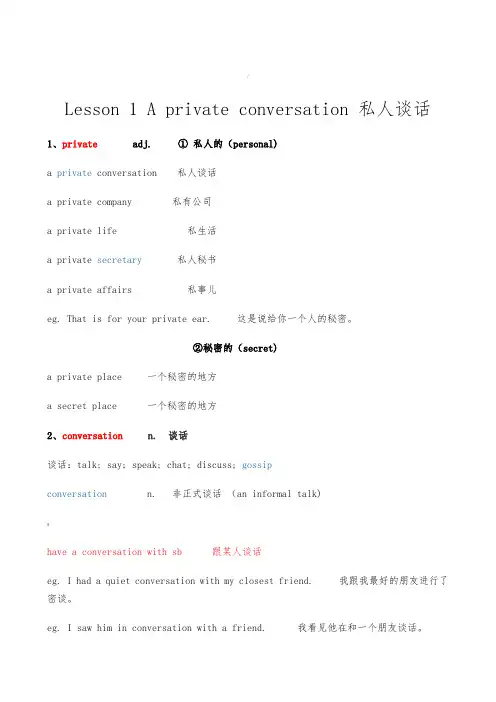
/Lesson 1 A private conversation 私人谈话1、private adj. ①私人的(personal)a private conversation 私人谈话a private company 私有公司a private life 私生活a private secretary私人秘书a private affairs 私事儿eg. That is for your private ear. 这是说给你一个人的秘密。
②秘密的(secret)a private place 一个秘密的地方a secret place 一个秘密的地方2、conversation n. 谈话谈话:talk; say; speak; chat; discuss; gossipconversation n. 非正式谈话(an informal talk)$have a conversation with sb 跟某人谈话eg. I had a quiet conversation with my closest friend. 我跟我最好的朋友进行了密谈。
eg. I saw him in conversation with a friend. 我看见他在和一个朋友谈话。
eg. No conversation while I'm talking. 我讲话的时候不要谈话。
相关短语:1)converse v.不及物动词,谈话 converse with sb 跟某人谈话2)talk n./v. talk with / to sb 和某人谈话talk with/to sb about sth 跟某人谈论什么事情:3)say vt. say sth 说了一些话said nothing. 他什么也没说。
eg. "What a lovely day," he said. 天气多好呀,他说4)speak vt. 讲(语言)speak a foreign language 讲一门外语speak Chinese 讲中文speak English 讲英语speak vi. 谈话speak to sb 和某人谈话speech n. 讲话谈话 make a speech 做演讲5)chat n./v. 聊天(talk friendly 友好地谈话)eg. We had a long chat about old times. 我们聊了很多关于过去的事。
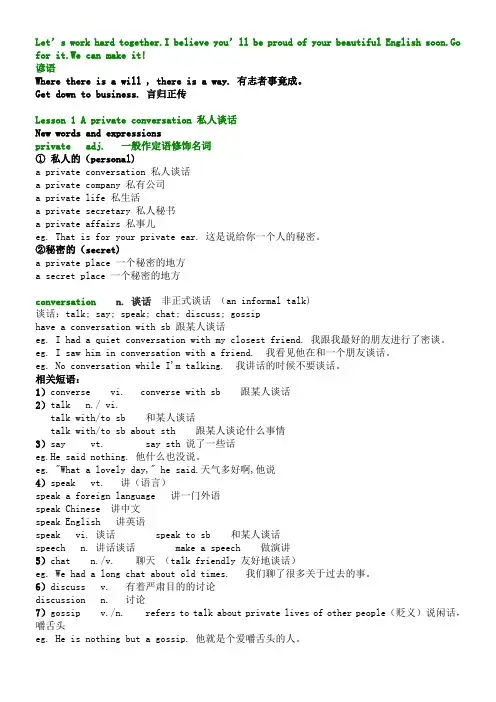
Let’s work hard together.I believe you’ll be proud of your beautiful English soon.Go for it.We can make it!谚语Where there is a will , there is a way. 有志者事竟成。
Get down to business. 言归正传Lesson 1 A private conversation 私人谈话New words and expressionsprivate adj. 一般作定语修饰名词① 私人的(personal)a private conversation 私人谈话a private company 私有公司a private life 私生活a private secretary 私人秘书a private affairs 私事儿eg. That is for your private ear. 这是说给你一个人的秘密。
②秘密的(secret)a private place 一个秘密的地方a secret place 一个秘密的地方conversation n. 谈话非正式谈话(an informal talk)谈话:talk; say; speak; chat; discuss; gossiphave a conversation with sb 跟某人谈话eg. I had a quiet conversation with my closest friend. 我跟我最好的朋友进行了密谈。
eg. I saw him in conversation with a friend. 我看见他在和一个朋友谈话。
eg. No conversation while I'm talking. 我讲话的时候不要谈话。
相关短语:1)converse vi. converse with sb 跟某人谈话2)talk n./ vi.talk with/to sb 和某人谈话talk with/to sb about sth 跟某人谈论什么事情3)say vt. say sth 说了一些话eg.He said nothing. 他什么也没说。
Lesson 1 A private conversation 二、【New words and expressions】生词和短语(12)private adj. 私人的conversation n. 谈话theatre n. 剧场,戏院seat n. 座位play n. 戏loudly adv. 大声地angry adj. 生气的angrily adv. 生气地attention n. 注意bear v. 容忍business n. 事rudely adv. 无礼地,粗鲁地1、private (1)adj. 私人的 同义词:personalprivate life 私生活private school 私立学校private letter 私人信件private conversation 私人谈话private company 私人公司private secretary 私人秘书private affairs 私事That is for your private ear. 那是说给你一个人听的秘密。
It's my private letter. (如果妈妈想看你的信)It's my private house. (如果陌生人想进你的房子)private 强调隐私 personal 仅指个人的,不强调隐私,没有秘密可言(2)adj. 秘密的 同义词:secreta private/secret place 一个秘密的地方(3)adj. 普通的private citizen 普通公民I'm a private citizen. (citizen n. 公民)private soldier 大兵《Private Ryan》(《拯救大兵瑞恩》)(4)public adj. 公众的,公开的(private 的反义词)public school 公立学校public letter 公开信public place 公共场所(5)privately adv. 私人、秘密 =in privatepublicly adv. 公开 =in public(6)privacy n.隐私It's privacy. 这是我的隐私!(不愿让别人知道的)2、conversation n.谈话 talk 内容可正式可不正式,也可以私人。
10/22/2012private adj conversation n 谈话threatre n 剧场,戏院seat n 座位play n loudly adj 大声地angry adj 生气的angrily adv 生气地attention n 注意bear (bore --boren)v 容忍business n 事rudely adv 无礼地,粗鲁地private 1adj 私人的(通常做定语修饰名词),(personal)A private conversation 私人谈话a private company 私有公司a private life 私生活a private secretary 私人秘书private affairs 私事egThat is for your private ear.这是说给你一个人的秘密。
2adj 秘密的(相当于secret)a private place= a secret place 一个秘密的地方conversation n 非正式谈话 (an informal talk)have aconversation with sb 跟某人谈话egI had a quiet conversation with my closest friend. 我和我最好的朋友进行密谈。
egI saw him in conversation with a friend. 我看见他跟朋友谈话。
egNo conversation while I am talking. 我讲话的时候不要谈话。
converse v 谈话(不及物动词)converse with sb 跟某人谈话talk n v 谈话talk with sb / talk to sb 跟某人谈话talk with sb about sth talk to sb about sth say vt 说(及物动词),后面直接跟说话的内容say sth 说了一些话egHe said nothing.他什么也没说。
lesson1单词讲解1. private adj.1) 私人的(personal)a private conversation 私人谈话a private company 私有公司a private life 私生活a private secretary 私人秘书private affairs 私事eg. That is for your private ear. 这是说给你一个人的秘密。
2) 秘密的 (secret)a private place 一个秘密的地方a secret place 一个秘密的地方2. conversation n. 谈话talk; say; speak; chat; discuss; gossipconversation n.非正式谈话 (an informal talk)have a conversation with sb. 跟某人谈话eg. I had a quiet conversation with my closest friend. 我跟我最好的朋友密谈。
eg. I saw him in conversation with a friend. 我看见他在跟一位朋友谈话。
eg. No conversation while I’m talking. 我讲话时不要谈话。
converse v. 谈话converse with sb. 跟某人谈话talk n./v. 谈论talk with/to sb. 同某人谈话talk with/to sb. about sth. 跟某人谈论某事say vt. 说say sth. 说了一些话eg. He said nothing. 他什么也没说。
eg. “What a lovely day ” , he said. “天气多好啊”,他说。
speak vt. 讲speak a foreign language 讲一门外语speak Chinese 讲中文speak English 讲英语speak vi. 说话,谈话speak to sb. 同某人谈话speech n. 讲话,谈话make a speech 发表演讲chat n./v. 聊天(talk friendly)eg. We had a long chat about old times. 我们聊了好多关于过去的事情。
Let’s work hard together.I believe you’ll be proud of your beautiful English soon.Go for it.We can make it!谚语Where there is a will , there is a way. 有志者事竟成。
Get down to business. 言归正传Lesson 1 A private conversation 私人谈话New words and expressionsprivate adj. 一般作定语修饰名词① 私人的(personal)a private conversation 私人谈话a private company 私有公司a private life 私生活a private secretary私人秘书a private affairs 私事儿eg. That is for your private ear. 这是说给你一个人的秘密。
②秘密的(secret)a private place 一个秘密的地方a secret place 一个秘密的地方conversation n. 谈话谈话:talk; say; speak; chat; discuss; gossipconversation n. 非正式谈话(an informal talk)have a conversation with sb 跟某人谈话eg. I had a quiet conversation with my closest friend. 我跟我最好的朋友进行了密谈。
eg. I saw him in conversation with a friend. 我看见他在和一个朋友谈话。
eg. No conversation while I'm talking. 我讲话的时候不要谈话。
相关短语:1)converse vi. converse with sb 跟某人谈话2)talk n./ vi. talk with/to sb 和某人谈话talk with/to sb about sth 跟某人谈论什么事情3)say vt. say sth 说了一些话eg.He said nothing. 他什么也没说。
Lesson 1 A private conversation[New words and expressions]生词和短语(12)pr i vate adj.私人的 conversation n. 谈话 theatre n.剧场,戏院seat IT 座位 angry adj.生气的 angr i ly adv.生乞地 attention n.注意bear v.容忍business n.爭rudely adv.无礼地,粗鲁地同艾词:persona Iprivate I ife 私生活 pr i vate school 私立学校 pr i vate letter 私人信件 pr i vate conversat ion 私人谈话 pr i vate company 私人公司 pr i vate secretary 私人缺书 pr i vate affairs 私爭That i s for your pr i vate ear.那是说给你一个人听的秘密。
It's my private letter ・(如杲妈妈想看你的信) It's my pr i vate house ・(如果陌生人想进你的房子)「private强调隐私t personal 仅指个人的.不强调隐私,没有秘密可言(2) adj.秘密的 同 51 词:secret (3) adj.普通的pr i vate citizen 普通公民I'm a pr i va te citizen. (ci tizen n. 公民) pr i vate soldier 大兵《Private Ryan 》(《拯救大兵瑞恩》)school 公立学校 letter公开信 place 公共场所 adv.私人、秘密(6) pr i vacy n.隐私11 * s privacy.这是我的隐私!(不愿让别人知道的)内容可正式可不正式,也可以私人。
Less on 1 A private con versati on1、private adj. ①私人的(personal)a private con versati on 私人谈话a private compa ny 私有公司a private life 私生活a private secretary 私人秘书a private affairs 私事儿eg. That is for your private ear. 这是说给你一个人的秘密②秘密的(secret)私人谈话a private place a secret place 一个秘密的地方一个秘密的地方2、conversation n. 谈话谈话:talk; say; speak; chat; discuss; gossipconv ersati on n. 非正式谈话(an in formal talk)have a conv ersatio n with sb 跟某人谈话eg. I had a quiet conversation with my closest friend. 我跟我最好的朋友进行了密谈eg. I saw him in conversation with a friend. eg. No conv ersati on while rm talki ng.相关短语:1) con verse v.不及物动词,谈话2) talk n./v.我看见他在和一个朋友谈话我讲话的时候不要谈话。
conv erse with sb 跟某人谈话talk with / to sb 和某人谈话talk with/to sb about sth 跟某人谈论什么事情6)discuss v.有着严肃目的的讨论discussi on n.讨论 话,嚼舌头eg. He is no thi ng but a gossip.3、 theatren. (in US: theater)剧场metre — meter (in US )centre — cen ter (in US ) 中心go to the theatre 去看戏,去剧院 go to the movies / cin ema / film 去看电影,movie (in US) :电影theatre= (口)play house 戏院theate goer 戏迷 go+er=goer 去的人。
也可以表达为: play goer4、seat(本课重点词)3) say vt.say sth说了一些话 eg.He said nothing.eg. "What a lovely day," he said. 4) speak vt. 讲speak a foreig n Ian guage speak Chin ese speak En glish speak vi. 谈话 speechn.讲话谈话5) chat n./v. 聊天他什么也没说。
天气多好呀,他说(语言)eg. We had a long chat about old times.讲一门外语 讲中文 讲英语speak to sb和某人谈话make a speech 做演讲(talk frien dly 友好地谈话)我们聊了很多关于过去的事7)gossipv./n. refers to talk about private lives of other people(贬义)说闲他就是个爱嚼舌头的人戏迷seat n./vt. [si:t] 长音 sit vi. [sit] 短音n.席位vt.安排……坐下seat sbseat yourself eg. Be seated, please.表示请坐的方式:eg. Sit dow n, please.Will you have a seat?Won't you have a seat?Would you have a seat?Be seated , please.Seat yourself, please.5、 play① n.玩耍,游戏,娱乐区别: chair seat椅子,可以搬动的n. 座位,固定在某地的eg. We don't have eno ugh chairs here. 我们没有足够的椅子。
eg. Is this seat take n?这个座位有人坐吗?①n.座位,座eg. Have a seat, please. / Take a seat, please. 请坐。
eg. I had a very good seat.我的座位非常好。
相当于 Maybe I sat in the front of the theatre. 很好。
也许是我坐在戏院的前面,所以说座位seatbelt=safety belt安全带in the driver's seat = in the leader's seat/place意思。
在领导的位置上,指某人非常重要的back-seat driver后座司机,指的是爱指手画脚的人。
Win / lose a seat赢得/输掉一个席位安排某人坐下你请坐请坐。
② v.玩,玩耍玩弄,摆弄什么东西 玩弄,摆弄一个球 玩弄,摆弄一个玩具 (酷栗)摆弄醋栗,表示当电灯泡,尤其是在情侣之间当电灯泡,也就是 妨碍别人谈恋爱的意思。
v.玩,比赛注意:在运动项目的前面不加定冠词"the"注意:在乐器的前面加"the"④n.戏剧,剧本戏剧,剧院上映的那些 电视剧电视连续剧,因为这样的电视连续在最初是由肥皂公司来赞助,在播放 的间隙,穿插的都是肥皂、清洁剂等商品的广告。
play goer 戏迷eg. It is as good as a play.(像戏一样的好)好玩极了。
eg. You must come here, or, there is no play. 你必须来这儿,否贝 U ,就没戏了。
no play 没戏区别:play 戏剧,剧本 drama戏,戏剧文学,戏剧艺术 opera 歌居 U Beiji ng Opera京居 U6、loud adj. 大声的playboy花花公子playgro und 操场play with sb跟某人玩;玩弄某人(慎重使用这个短语)play with sth play with a ballplay with a toyplay football 踢足球 play basketball 打篮球 play volleyball打台球 play cards打扑克play chess下棋play gooseberry play the pia no 弹钢琴 guitar 弹吉他 play the violin 拉小提琴 play thetheatre play TV playsoap playloudly adv.大声地 aloud adv.大声地eg. She called loudly for help.=She called aloud for help. 她大声呼救。
think aloud 自言自语 adj. + ly f adv. angry adj. f angrily adv. rude adj. f rudely adv.eg. The young man said rudely.这个年轻人粗鲁的说。
real adj. f really adv. exact adj. f exactly adv quickadj.f quicklyadv.quietadj.f quietlyadv.draw on e's atte nti on /attract on e's atte nti oneg. The new type of computer draws our atte nti on.atte nti onv. 注意eg. Atte ntio n, please.请注意。
(讲一件事情,要吸引别人的目光时可以这样用)eg. Atte ntio n, passe ngers. The pla ne leaves at 9 o'clock.乘客们请注意,飞机在 9点起飞。
(机场广播会有类似的句子)eg. Ladies and gentlemen, may I get your attention, please? (正式的场合,比如国际会议上)7、 attention n.pay atte nti on to sthpay some attention to sth pay more attention to sth pay close attention to sth pay great attention to sth pay eno ugh atte nti on to sth pay little attention to sth pay noattention to sth pay no atte nti on to... turn a bli nd eye to... turn a deaf ear to... 对 给予注意 给予一定的注意 给予更多的注意 给予密切的注意 给予极大的注意 给予足够的注意 很少注意根本不注意,毫不理会毫不理会 视而不见 充耳不闻吸引••…注意力新款计算机吸引了我们的注意力女士们先生们请注意eg. That's all. Thank you for your atte nti on.a bear market 熊市(股票下跌的行情) a bull market牛市(股票上扬的行情)a bear hug 紧紧地拥抱(熊抱)eg. The old lady saw me and came and gave me a bear hug.那个老太太看见我,走过来,给了我一个大大的拥抱。
成语:bear's service 帮倒忙,好心做坏事源自:俄国作家克雷洛夫的寓言《隐士和熊》一一有个隐士久居荒郊,后来跟一只寂寞的熊成为好朋友。
有一天,隐士正在午睡时,一只苍蝇落在他的脸上,熊想帮隐士把苍蝇赶跑, 可是怎么赶也赶不走,这只熊就生气了,抱起一块大石头就朝苍蝇砸了过去,结果可想而知, 苍蝇是被砸死了,可是隐士也被砸死了。
由这个故事我们就把 bear's service 比喻成 帮倒 忙,好心做错事”。
② v. 忍受(stand; put up with sb )eg. I can't bear the young man and the young woma n beh ind me.我无法忍受身后的这对青年男女。